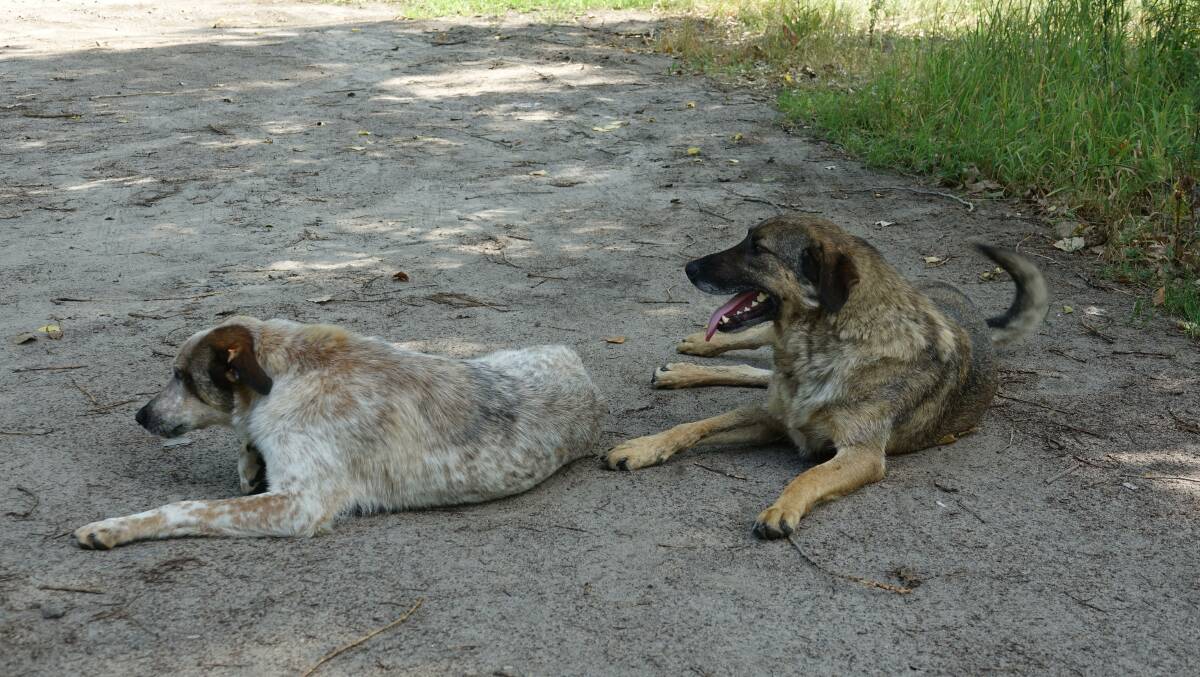
Ukraine is an unfolding human tragedy that could have been avoided if both sides had been prepared to make concessions.
Subscribe now for unlimited access.
$0/
(min cost $0)
or signup to continue reading
The tragedy also extends to Ukraine's animal population.
In July 2019 I stayed for a week at the Premier Hotel Rus in downtown Kyiv - which is still taking room bookings. One of my first priorities on arrival was to find the nearest swimming pool. The Olimp swimming pool on Dilova Street was about two kilometres' walk away through a wooded hilly area known as Pechers'kyi. Over the next few days, I discovered there was a pack of about 10 dogs living in the woods. The dogs were extremely nervous of humans.
Most Ukrainians did not seem to regard dogs as companions, but rather as an animal that sometimes was useful for working purposes - such as guarding industrial sites. I looked unsuccessfully in the supermarkets for dog treats, and staff look puzzled when I described them.
My second experience with Ukrainian dogs was at the Chernobyl Exclusion Zone. I stayed overnight there at Pripyat's Desyatka Hotel. The 2600-square-kilometre Exclusion Zone radiates (no pun intended) out from the damaged nuclear plant. The zone has been largely off limits to humans since 1986. That has helped it become a haven for wildlife, with lynx, bison, deer and other animals roaming freely through the forests that extend north into Belarus. Wild animals have prospered there because it's off limits for hunters and eating animals from the zone is considered a health risk.
Among the animals were stray wild dogs, which were actually quite friendly because they were regularly fed by foreign visitors. I had read about them back in Kyiv, so I had brought rather smelly preserved sausages to give to them, much to the discomfort of my fellow travellers. From a dog's point of view, no doubt the smellier the better.
We were advised not to touch the dogs because their fur carries radioactivity. In the winter they are hunted by wolves that come into Ukraine from Belarus. The dogs hide in Pripyat's abandoned buildings to try to survive the winter.
The challenge now for the wild deer and other herbivores is surviving in an active combat zone, particularly since Russian soldiers are well-armed and short on rations.
On the zoo front, there are eight public zoos in Ukraine - at Kyiv, Kharkiv, Mykolaiv, Lutsk, Odessa, Rivne, Medenytskyy and Cherkasy. The three largest are those at Kyiv, Kharkiv and Mykolaiv. In addition, some Ukrainian oligarchs and wealthy Ukrainians have private zoos and exotic animals.
READ MORE:
Since the Russian invasion a few zoo animals have been moved to zoos in neighbouring Poland, but in most cases it's not practical to move them. Animals undergoing transfer can experience dehydration, fatigue, behavioural changes, and stress. Many animals are understandably panicked by the sounds of war and are being sedated. In some cases, keepers are staying overnight with their animals to comfort them.
The zoos at Kharkiv and Kyiv have been damaged by Russian shelling, and some animals escaped at Kharkiv, including a young lion - but all except for a small pack of red wolves were recovered. Most of the zoos, including the ones in besieged Kharkiv and Mykolaiv, are still open to visitors because they need the money to keep operating. The Kyiv Zoo is temporarily closed.
Dogs and cats are the most numerous urban animals in Ukraine. They will be trying to survive on their own if their owners have been killed or disappeared. Some animal welfare groups and animal activists have managed to evacuate dogs and cats from combat zones to shelters in safer areas. In Przemysl, a Polish town near the Ukrainian border, an animal shelter has been working to save as many sick and wounded abandoned Ukrainian animals as it can.
There is a continuing need for donations to sustain the animal rescue and support effort. Ukraine is one of the most corrupt countries in Europe, so the safest option is to donate to a well-known Western charity that is active on the ground in Ukraine. Naturewatch Foundation is one such (British) charity that is seeking donations.
Naturewatch has been active in Ukraine since 1994, trying to help improve the lives of Ukraine's animals by pressuring the government to stamp out animal crime, humanely manage stray dog populations, and promote responsible animal ownership.
- Clive Williams is a visiting fellow at the ANU's Strategic and Defence Studies Centre.
- To donate to Naturewatch's Ukraine appeal, go to naturewatch.org/campaigns/ukraine-animal-welfare

